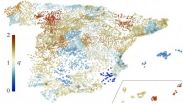(Press-News.org) COLUMBUS, Ohio – A new study suggests that people get frustrated when they are offered the opportunity to cheat or steal and that chance is then taken away from them.
Other studies have shown that blocking people from achieving their positive goals increases frustration, which is not surprising. But this is the first to show that even denying people the chance to commit forbidden behaviors can increase frustration.
That's not all. The researchers also found that people who are frustrated in their attempts to cheat or steal are more likely than others to be attracted to violent video games.
"We made new discoveries in what makes people frustrated and aggressive, but also what people do when they're feeling this frustration," said Brad Bushman, co-author of the study and professor of communication and psychology at Ohio State University.
"Our results help us understand why people are attracted to violent entertainment in the first place – they feel they can take out their frustration virtually."
Bushman conducted the study with Jodi Whitaker, a graduate student at Ohio State, and Andre Melzer and Georges Steffgen of the University of Luxembourg.
Their results appear online in the journal Psychological Science.
The researchers conducted two experiments. The first involved 120 male college students, who were given 30 minutes to complete a multiple-choice history exam. They were told that those who did well on the exam would earn chocolates or apples (their choice).
All of the participants were given the exam in an envelope. But half of them received a completed exam with a score of 100 percent marked at the top – the test had no name on it, so they could claim it as their own.
After five minutes, the experimenter interrupted participants and said: "Sorry, I gave you the wrong copy of the exam." The participants handed back their exams in the envelope, and were given another envelope with the exam. This exam was also either scored 100 percent or left blank.
Of those who initially were given the chance to cheat on the exam, half still had the chance to cheat, while that chance was withdrawn for the other half.
After turning in their tests, the students waited to receive their grades.
The question was: How would those people who lost their chance to cheat react? To find out, the students were told they could complete a brief study about video games while they waited for their test results.
Participants read descriptions of eight fictitious video games, four violent and four nonviolent, and rated how much they wanted to play each game on a scale of 1 (not at all) to 10 (extremely).
Those students who had the chance to cheat withdrawn were more attracted to the violent video games than those in the other two groups (never had a chance to cheat, or had a chance to cheat the entire time). The latter two groups did not differ in their attraction to violent video games.
None of the three groups differed in their attraction to nonviolent games.
Bushman noted that none of the students admitted to cheating, or having the chance to cheat, even though they did cheat (as evidenced by their scores). But the students who were denied the chance to cheat obviously had a different view than others on their video game choices.
"Because violent video games permit aggression, they may be especially attractive to people who experience frustration," Bushman said. "We believe students felt frustrated when they didn't get a chance to cheat on the test."
The researchers looked more closely at the link between frustration and attraction to violent video games in a second experiment that included 141 male college students. This experiment involved stealing rather than cheating. Students used a bowl of quarters to demonstrate their estimate of how many coins would weigh the same as an object.
In a similar setup to the first study, some students had the opportunity to steal coins, while others had that opportunity taken away from them. The remainder never had the opportunity to steal.
Afterwards, the students completed a "mood" form, in which they were asked to rate on a scale of one to five how much they felt various feelings, including frustration. They then rated how much they wanted to play the same eight fictitious video games used in the first study.
First of all, students who did have the chance to steal tended to do so – an average of between about one and three quarters, depending on their level of access, Bushman said.
Those who had the chance to steal withdrawn from them showed higher-than-average levels of frustration than those in the other two groups – and they were more likely to be attracted to the violent video games.
"The prevention of taboo behaviors like stealing produces frustration, just as does the prevention of more desirable goals," Bushman said. "This is a new finding that adds to our understanding of what causes frustration and aggression."
The results also help explain the appeal of violent video games.
"Many people believe that violent video games are a kind of catharsis, allowing them to alleviate angry feelings," he said. "Research findings suggest this isn't true, but that's part of the appeal to many people."
### Contact: Brad Bushman, (614) 688-8779; Bushman.20@osu.edu
Written by Jeff Grabmeier, (614) 292-8457; Grabmeier.1@osu.edu
Denied the chance to cheat or steal, people turn to violent video games
2013-03-11
ELSE PRESS RELEASES FROM THIS DATE:
Pittsburgh's leaky faucet: How aging sewers are impacting urban watersheds
2013-03-11
PITTSBURGH—Aging sewer systems are spilling a considerable amount of nitrogen into urban watersheds, diminishing both the quality of water and ecosystems' habitats. However, many studies documenting the impacts of nitrogen on urban environs have not properly estimated the contribution of leaky sewer systems—until now.
Aging sewer systems are spilling a considerable amount of nitrogen into urban watersheds, diminishing both the quality of water and the ecosystems' habitats.
Using water samples from the Pittsburgh-based Nine Mile Run watershed, a Pitt research team reveals ...
New program available to reduce stress among teenagers
2013-03-11
This press release is available in French.
Families with a child completing elementary school this year are now preparing their registration for high school, a transition that is often stressful for children. A new program has demonstrated that it is possible to significantly reduce stress in some of these children thanks to a new educational tool designed under the leadership of Sonia Lupien, Director of the Centre for Studies on Human Stress (CSHS) and professor at the University of Montreal.
A study published in February in Neuroscience confirms the benefits of ...
Discovery may explain how prion diseases spread between different types of animals
2013-03-11
Medical researchers at the University of Alberta have made a discovery that may explain how prion diseases, like chronic wasting disease and mad cow disease, adapt in order to spread between various types of animals.
The research team, led by neurologist Valerie Sim, discovered that a miniscule change in the prions' makeup appears to give the disease the ability to adapt – to mimic and recreate new strains with which it comes into contact. The team has been studying this area for two years.
"Prion diseases don't always successfully go from one animal to another, but when ...
Untangling life's origins
2013-03-11
URBANA – Researchers in the Evolutionary Bioinformatics Laboratory at the University of Illinois in collaboration with German scientists have been using bioinformatics techniques to probe the world of proteins for answers to questions about the origins of life.
Proteins are formed from chains of amino acids and fold into three-dimensional structures that determine their function. According to crop sciences professor Gustavo Caetano-Anollés, very little is known about the evolutionary drivers for this folding.
In collaboration with scientists at the Heidelberg Institute ...
The dynamic of Spain's population follows the maximum entropy principle
2013-03-11
A team of Spanish and Argentinean researchers have verified that the distribution of the inhabitants in each Spanish province evolves in accordance with the maximum entropy principle in the field of physics. Therefore, this evolution is predictable. The results have allowed authors to put forward a 'socio-thermodynamic' theory that applies the laws of thermodynamics to collective human behaviour.
Spanish and Argentinean scientists have researched the way in which we as people group together on a large scale as a way of seeing whether there is any law or pattern that explains ...
Ground-level ozone falling faster than model predicted
2013-03-11
There is good news and better news about ground-level ozone in American cities. While dangerous ozone levels have fallen in places that clamp down on emissions from vehicles and industry, a new study from Rice University suggests that a model widely used to predict the impact of remediation efforts has been too conservative.
Particularly in Northeastern cities, ozone levels dropped even beyond what was anticipated by cutting emissions of nitrogen oxides (NOx) from 2002 to 2006. The study published online by the journal Atmospheric Environment suggests the Community Multiscale ...
Can energy drinks improve the physical and mental performance of cyclists?
2013-03-11
New Rochelle, NY, March 11, 2013–Consumption of energy drinks containing caffeine may have beneficial effects on exercise but probably not for mental function. The effects of pre-exercise caffeine consumption by trained cyclists on racing times and cognitive performance were measured and are reported in Journal of Caffeine Research, a peer-reviewed journal from Mary Ann Liebert, Inc., publishers. The article is available free on the Journal of Caffeine Research website at http://www.liebertpub.com/jcr.
Race performance improved for all study participants after consuming ...
Common MS drugs taken together do not reduce relapse risk
2013-03-11
A recent clinical trial found that interferonβ-1a (INF) and glatiramer acetate (GA), two of the most commonly prescribed drugs for multiple sclerosis (MS), provide no additional clinical benefit when taken together. While findings published today in Annals of Neurology, a journal of the American Neurological Association and Child Neurology Society, suggest that taking both INF and GA together was not superior to GA monotherapy in reducing relapse risk; the combination therapy does appear to reduce new lesion activity and total lesion volume.
The National Institute ...
The closest star system found in a century
2013-03-11
A pair of newly discovered stars is the third-closest star system to the Sun, according to a paper that will be published in Astrophysical Journal Letters. The duo is the closest star system discovered since 1916. The discovery was made by Kevin Luhman, an associate professor of astronomy and astrophysics at Penn State University and a researcher in Penn State's Center for Exoplanets and Habitable Worlds.
Both stars in the new binary system are "brown dwarfs," which are stars that are too small in mass to ever become hot enough to ignite hydrogen fusion. As a result, ...
Stroke risk in elderly treated with antipsychotics is newly linked to specific drug actions
2013-03-11
Philadelphia, PA, March 11, 2013 – Antipsychotic administration in the elderly is associated with an increased risk for cerebrovascular accident, more commonly known as stroke; a new study published in Biological Psychiatry provides additional insight into this important relationship.
Antipsychotics are prescribed to elderly patients to treat symptoms such as agitation, psychosis, anxiety, insomnia, and depression. The increased risk of stroke associated with these medications was identified approximately a decade ago and has since been replicated by subsequent studies. ...


